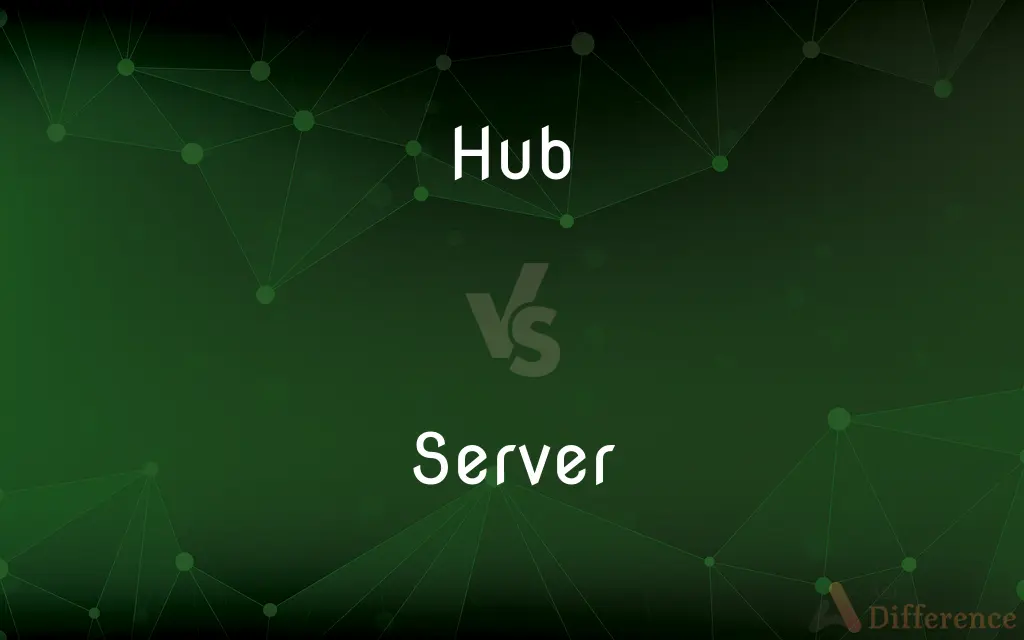Hub vs. Server — What's the Difference?
By Tayyaba Rehman & Maham Liaqat — Updated on April 29, 2024
A hub is a simple networking device that broadcasts data to all connected devices, while a server is a powerful computer designed to provide data, services, or programs to other computers over a network.

Difference Between Hub and Server
Table of Contents
ADVERTISEMENT
Key Differences
A hub is a basic networking device used to connect multiple Ethernet devices, making them act as a single network segment. It broadcasts all incoming network traffic to each port, regardless of the intended recipient. In contrast, a server is a computer designed to process requests and deliver data to other computers over a local network or the Internet, handling more complex tasks like hosting websites, managing databases, or running applications.
Hubs operate on the first layer of the OSI model, which is the physical layer; they are not aware of the data's content that passes through them. On the other hand, servers operate at higher levels in the OSI model, depending on the services they provide, such as the application layer for web servers or the presentation layer for file servers.
The use of a hub can lead to network inefficiencies and collisions because data packets are sent to all connected devices, without any form of data filtering or management. Whereas servers manage network traffic intelligently, directing data only to the devices that have requested it, thereby increasing efficiency and security within network communications.
In terms of functionality, hubs are significantly less complex than servers; they are plug-and-play devices that do not require configuration. Servers, however, are complex systems that require significant setup and ongoing management, involving installation of operating systems, applications, and security updates.
While hubs are generally being phased out in favor of more sophisticated networking devices like switches, which filter and forward data to specific devices on the network, servers are evolving with advances in technology, increasingly moving towards virtualization and cloud-based solutions which offer scalability, redundancy, and efficient resource management.
ADVERTISEMENT
Comparison Chart
Function
Broadcasts data to all connected devices
Provides specific data and services
Network Layer
Physical layer (Layer 1)
Varies, typically higher OSI layers
Data Handling
Non-selective, broadcasts everything
Selective, sends data where needed
Complexity
Low, no configuration needed
High, requires setup and management
Modern Usage
Decreasing, replaced by more advanced devices
Increasing, evolving with new technologies
Compare with Definitions
Hub
Transmits data packets to all ports regardless of the destination.
The hub broadcasts incoming messages to every connected device.
Server
A computer that serves information to other computers on a network.
Our company’s email server handles all incoming and outgoing messages.
Hub
A simple networking device that connects multiple Ethernet devices.
We used a hub to connect all our office computers to the same network.
Server
Essential for managing network resources and services.
The file server ensures employees can access and store their files centrally.
Hub
Often used in small or temporary network setups.
The event organizers set up a temporary hub to connect various vendor stalls.
Server
Evolves with technology, increasingly moving towards cloud solutions.
We migrated our servers to the cloud to improve scalability and reduce maintenance.
Hub
Limited by collisions and network inefficiencies.
The network slowed down significantly due to the hub’s inability to filter traffic.
Server
Can perform a variety of specialized roles like file server, web server, or database server.
The web server hosts our website and handles all visitor requests.
Hub
Boston, Massachusetts. Used with the.
Server
Requires substantial configuration and management.
Setting up the new server required installing several software applications and security protocols.
Hub
Operates at the physical layer of the OSI model.
As a layer 1 device, the hub does not manage any data traffic itself.
Server
Something, such as a tray, that is used in serving food and drink.
Hub
(networking) A computer networking device connecting several Ethernet ports. See switch.
Server
An altar server.
Hub
The center part of a wheel, fan, or propeller.
Server
A computer that processes requests for HTML and other documents that are components of webpages.
Hub
A center of activity or interest; a focal point
Hollywood is the hub of the US movie industry.
Server
One who serves food and drink. See Usage Note at waiter.
Hub
The central part, usually cylindrical, of a wheel; the nave.
Server
(Law) One who serves a legal process, such as a summons or court order.
Hub
A point where many routes meet and traffic is distributed, dispensed, or diverted.
Hong Kong International Airport is one of the most important air traffic hubs in Asia.
Server
(Sports) The player who serves, as in court games.
Hub
A central facility providing a range of related services, such as a medical hub or an educational hub.
Server
A file server.
Hub
(surveying) A stake with a nail in it, used to mark a temporary point.
Server
(computing) A program that provides services to other programs or devices, either in the same computer or over a computer network.
Hub
A male weasel; a buck; a dog; a jack.
Server
(computing) A computer dedicated to running such programs.
Hub
(US) A rough protuberance or projecting obstruction.
A hub in the road
Server
One who serves.
Hub
(video games) An area in a video game from which individual levels are accessed.
Server
A waitress or waiter.
Hub
A goal or mark at which quoits, etc., are thrown.
Server
The player who serves the ball.
Hub
A hardened, engraved steel punch for impressing a device upon a die, used in coining, etc.
Server
(Christianity) A priest's attendant at the celebration of the Eucharist.
Hub
A screw hob.
Server
A tray for dishes.
Hub
A block for scotching a wheel.
Server
A spoon for serving food.
Hub
The central part, usually cylindrical, of a wheel; the nave. See Illust. of Axle box.
Server
One who serves.
Hub
The hilt of a weapon.
Server
A tray for dishes; a salver.
Hub
A rough protuberance or projecting obstruction; as, a hub in the road. [U.S.] See Hubby.
Server
A person whose occupation is to serve at table (as in a restaurant)
Hub
A goal or mark at which quoits, etc., are cast.
Server
(court games) the player who serves to start a point
Hub
A hardened, engraved steel punch for impressing a device upon a die, used in coining, etc.
Server
(computer science) a computer that provides client stations with access to files and printers as shared resources to a computer network
Hub
A screw hob. See Hob, 3.
Server
Utensil used in serving food or drink
Hub
A block for scotching a wheel.
Hub
The central location within which activities tend to concentrate, or from which activities radiate outward; a focus of activity.
Hub
A large airport used as a central transfer station for an airline, permitting economic air transportation between remote locations by directing travellers through the hub, often changing planes at the hub, and thus keeping the seat occupancy rate on the airplanes high. The hub together with the feeder lines from remote locations constitute the so-called hub and spoke system of commercial air passenger transportation. A commercial airline may have more than one such hub.
Hub
The city of Boston, Massachusetts referred to locally by the nickname The Hub.
Hub
The central part of a car wheel (or fan or propeller etc) through which the shaft or axle passes
Hub
A center of activity or interest or commerce or transportation; a focal point around which events revolve;
The playground is the hub of parental supervision
The airport is the economic hub of the area
Common Curiosities
What are the different types of servers?
Common types of servers include web servers, file servers, database servers, and mail servers, each serving different functions.
Why are hubs considered less efficient than switches or routers?
Hubs are less efficient because they broadcast all incoming data to every port without discrimination, leading to potential data collisions and network traffic issues.
Is it possible for a small business to run without a dedicated server?
Yes, small businesses can run without a dedicated server by using cloud services or hosted solutions that provide similar functionalities.
What is the primary function of a hub in networking?
The primary function of a hub is to connect multiple Ethernet devices and broadcast data packets to all connected devices indiscriminately.
How do servers contribute to data security?
Servers contribute to data security by implementing various security measures, such as firewalls, encryption, and access controls, to protect sensitive information.
What is the future trend for servers in networking?
The future trend for servers involves more virtualization and cloud-based solutions, enhancing scalability, redundancy, and cost-efficiency.
How do servers facilitate remote computing?
Servers facilitate remote computing by hosting applications and data that can be accessed over the Internet, allowing users to work remotely.
What is a virtual server?
A virtual server is a software-based server that runs on physical servers but functions as a separate and independent server, allowing for more efficient resource utilization and management.
Can a hub manage network traffic?
No, a hub cannot manage network traffic; it simply repeats the data it receives to all connected devices.
How do I choose between a hub and a switch for my network?
Typically, a switch is preferred over a hub for most modern networks due to its ability to intelligently manage data traffic and reduce collisions.
Share Your Discovery

Previous Comparison
Demo vs. Trial
Next Comparison
Exaggerate vs. EmbellishAuthor Spotlight
Written by
Tayyaba RehmanTayyaba Rehman is a distinguished writer, currently serving as a primary contributor to askdifference.com. As a researcher in semantics and etymology, Tayyaba's passion for the complexity of languages and their distinctions has found a perfect home on the platform. Tayyaba delves into the intricacies of language, distinguishing between commonly confused words and phrases, thereby providing clarity for readers worldwide.
Co-written by
Maham Liaqat















































